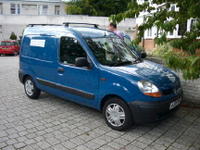 At today’s Connected Car conference, Dr Robert Harle of the University of Cambridge’s Computer Laboratory outlined some interesting insights into the car of tomorrow.
At today’s Connected Car conference, Dr Robert Harle of the University of Cambridge’s Computer Laboratory outlined some interesting insights into the car of tomorrow.
The lab has outfitted a Renault Kangoo van as a mobile testbed for what the researchers call a “sentient vehicle”. It now boasts a desktop computer complete with mouse, monitor and keyboard (and in fact a desk) in the rear load area, plus a high-spec GPS system, GPRS mobile telephony and Wi-Fi links, forward-looking camera, plus an LCD touch screen and USB connectors up in front by the driver. The PC provides the brains for a variety of projects encompassing car-to-car and car-to-fixed communications; wide-area data collection such as pollution monitoring; vehicle tracking; location-aware computing; and studying driving habits. One of the most promising innovations is a proposal for road usage charging that promises to detect non-payment without invading people’s privacy by tracking their every move - and thus violating the Human Rights Act.
One of the most promising innovations is a proposal for road usage charging that promises to detect non-payment without invading people’s privacy by tracking their every move - and thus violating the Human Rights Act.
All road charging systems require a location-aware black box of some sort. Harle proposes that it should be capable of examining not the car it’s installed in, but the car in front. In operation, it would work as follows.
- The car uses GPS to determine which charging zone it is in.
- A camera that is part of the black box detects when there is another vehicle ahead.
- The black box wirelessly connects to its counterpart in the car in front, demanding an encrypted token that will prove that the car in front has paid the charge.
- If a valid token is received, the first black box does nothing more, simply waiting until a different vehicle is ahead before repeating the procedure.
- If no valid token is received, licence plate data and an image of the vehicle ahead is stored automatically and then uploaded to the charging authority when the car next passes a roadside wireless access point.
Despite its elegance, it seems unlikely to be adopted by governments intent on the spin-off benefits that would come through using black boxes to detect speed violations and to track those who are under surveillance.
Update: The Times has now published a piece based on Dr Harle’s talk.



